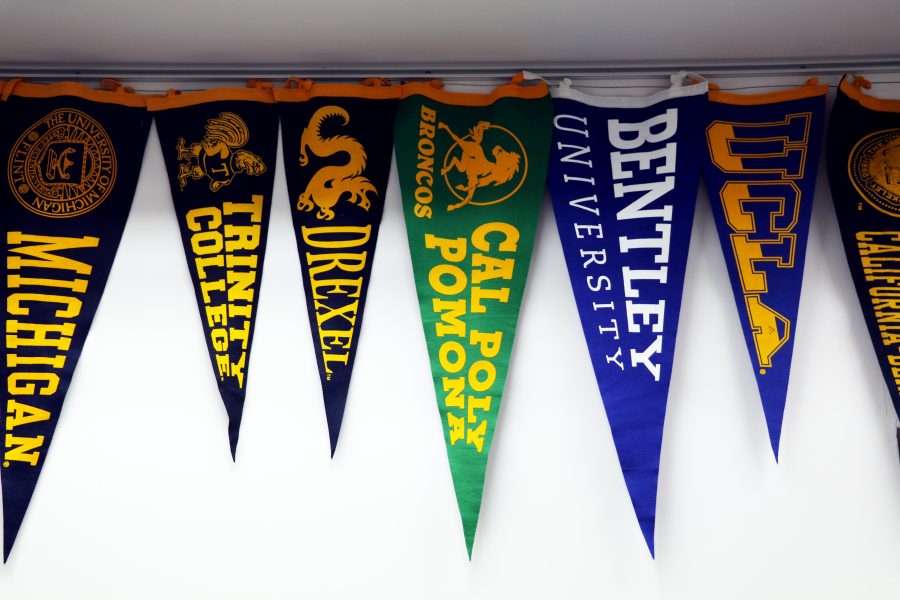Demystifying the college admissions process
Blaming college application fees is not the answer
Many people who write opinion articles love to criticize. Dissatisfied with the status quo, they denounce everything that can be denounced, and call for change. For once, however, I am not criticizing anything in this piece. Instead, while many students argue that college application fees are exorbitantly expensive, I believe that the fees are justified.
Colleges need to hire many admissions specialists to read the many applications they receive each year. In 2016, The University of California, Los Angeles received 119,000 applications, which shows why the University of California charges an extra $70 US for each additional campus if students apply to more than four. There is only a limited number of admissions specialists reading these apps.
Moreover, the application fee also encourages students to carefully decide the colleges they want to apply to. If there were no application fee, prestigious universities like the Ivy League schools would be overwhelmed by hundreds of thousands of applications from hopeful students, creating excessive work for their admissions officers. Similarly, high school college counselors and students themselves would suffer, as parents would force their children to apply to dozens of schools.
It is also noteworthy that students now have access to Common App, a system where the college application process is simplified and centralized. The college application fees are still present, however, through Common App, there is an option of requesting a fee waiver if the application fee poses a financial burden. Therefore, this is beneficial to students from lower-income families. For students from higher-income families, on the other hand, a $90 US fee is not considered a significant amount money, especially compared to tuition fees.
All in all, college application fees are justified considering colleges need to hire admissions officers to read the applications. The fees also alleviate the workloads for students and college counselors. Finally, having access to a fee waiver can reduce costs for lower-income families.
Blaming college application fees is not the answer
Many people who write opinion articles love to criticize. Dissatisfied with the status quo, they denounce everything that can be denounced, and call for change. For once, however, I am not criticizing anything in this piece. Instead, while many students argue that college application fees are exorbitantly expensive, I believe that the fees are justified.
Colleges need to hire many admissions specialists to read the many applications they receive each year. In 2016, The University of California, Los Angeles received 119,000 applications, which shows why the University of California charges an extra $70 US for each additional campus if students apply to more than four. There is only a limited number of admissions specialists reading these apps.
Moreover, the application fee also encourages students to carefully decide the colleges they want to apply to. If there were no application fee, prestigious universities like the Ivy League schools would be overwhelmed by hundreds of thousands of applications from hopeful students, creating excessive work for their admissions officers. Similarly, high school college counselors and students themselves would suffer, as parents would force their children to apply to dozens of schools.
It is also noteworthy that students now have access to Common App, a system where the college application process is simplified and centralized. The college application fees are still present, however, through Common App, there is an option of requesting a fee waiver if the application fee poses a financial burden. Therefore, this is beneficial to students from lower-income families. For students from higher-income families, on the other hand, a $90 US fee is not considered a significant amount money, especially compared to tuition fees.
All in all, college application fees are justified considering colleges need to hire admissions officers to read the applications. The fees also alleviate the workloads for students and college counselors. Finally, having access to a fee waiver can reduce costs for lower-income families.
Blaming college application fees is not the answer
Many people who write opinion articles love to criticize. Dissatisfied with the status quo, they denounce everything that can be denounced, and call for change. For once, however, I am not criticizing anything in this piece. Instead, while many students argue that college application fees are exorbitantly expensive, I believe that the fees are justified.
Colleges need to hire many admissions specialists to read the many applications they receive each year. In 2016, The University of California, Los Angeles received 119,000 applications, which shows why the University of California charges an extra $70 US for each additional campus if students apply to more than four. There is only a limited number of admissions specialists reading these apps.
Moreover, the application fee also encourages students to carefully decide the colleges they want to apply to. If there were no application fee, prestigious universities like the Ivy League schools would be overwhelmed by hundreds of thousands of applications from hopeful students, creating excessive work for their admissions officers. Similarly, high school college counselors and students themselves would suffer, as parents would force their children to apply to dozens of schools.
It is also noteworthy that students now have access to Common App, a system where the college application process is simplified and centralized. The college application fees are still present, however, through Common App, there is an option of requesting a fee waiver if the application fee poses a financial burden. Therefore, this is beneficial to students from lower-income families. For students from higher-income families, on the other hand, a $90 US fee is not considered a significant amount money, especially compared to tuition fees.
All in all, college application fees are justified considering colleges need to hire admissions officers to read the applications. The fees also alleviate the workloads for students and college counselors. Finally, having access to a fee waiver can reduce costs for lower-income families.
Blaming college application fees is not the answer
Many people who write opinion articles love to criticize. Dissatisfied with the status quo, they denounce everything that can be denounced, and call for change. For once, however, I am not criticizing anything in this piece. Instead, while many students argue that college application fees are exorbitantly expensive, I believe that the fees are justified.
Colleges need to hire many admissions specialists to read the many applications they receive each year. In 2016, The University of California, Los Angeles received 119,000 applications, which shows why the University of California charges an extra $70 US for each additional campus if students apply to more than four. There is only a limited number of admissions specialists reading these apps.
Moreover, the application fee also encourages students to carefully decide the colleges they want to apply to. If there were no application fee, prestigious universities like the Ivy League schools would be overwhelmed by hundreds of thousands of applications from hopeful students, creating excessive work for their admissions officers. Similarly, high school college counselors and students themselves would suffer, as parents would force their children to apply to dozens of schools.
It is also noteworthy that students now have access to Common App, a system where the college application process is simplified and centralized. The college application fees are still present, however, through Common App, there is an option of requesting a fee waiver if the application fee poses a financial burden. Therefore, this is beneficial to students from lower-income families. For students from higher-income families, on the other hand, a $90 US fee is not considered a significant amount money, especially compared to tuition fees.
All in all, college application fees are justified considering colleges need to hire admissions officers to read the applications. The fees also alleviate the workloads for students and college counselors. Finally, having access to a fee waiver can reduce costs for lower-income families.
Blaming college application fees is not the answer
Many people who write opinion articles love to criticize. Dissatisfied with the status quo, they denounce everything that can be denounced, and call for change. For once, however, I am not criticizing anything in this piece. Instead, while many students argue that college application fees are exorbitantly expensive, I believe that the fees are justified.
Colleges need to hire many admissions specialists to read the many applications they receive each year. In 2016, The University of California, Los Angeles received 119,000 applications, which shows why the University of California charges an extra $70 US for each additional campus if students apply to more than four. There is only a limited number of admissions specialists reading these apps.
Moreover, the application fee also encourages students to carefully decide the colleges they want to apply to. If there were no application fee, prestigious universities like the Ivy League schools would be overwhelmed by hundreds of thousands of applications from hopeful students, creating excessive work for their admissions officers. Similarly, high school college counselors and students themselves would suffer, as parents would force their children to apply to dozens of schools.
It is also noteworthy that students now have access to Common App, a system where the college application process is simplified and centralized. The college application fees are still present, however, through Common App, there is an option of requesting a fee waiver if the application fee poses a financial burden. Therefore, this is beneficial to students from lower-income families. For students from higher-income families, on the other hand, a $90 US fee is not considered a significant amount money, especially compared to tuition fees.
All in all, college application fees are justified considering colleges need to hire admissions officers to read the applications. The fees also alleviate the workloads for students and college counselors. Finally, having access to a fee waiver can reduce costs for lower-income families.
Blaming college application fees is not the answer
Many people who write opinion articles love to criticize. Dissatisfied with the status quo, they denounce everything that can be denounced, and call for change. For once, however, I am not criticizing anything in this piece. Instead, while many students argue that college application fees are exorbitantly expensive, I believe that the fees are justified.
Colleges need to hire many admissions specialists to read the many applications they receive each year. In 2016, The University of California, Los Angeles received 119,000 applications, which shows why the University of California charges an extra $70 US for each additional campus if students apply to more than four. There is only a limited number of admissions specialists reading these apps.
Moreover, the application fee also encourages students to carefully decide the colleges they want to apply to. If there were no application fee, prestigious universities like the Ivy League schools would be overwhelmed by hundreds of thousands of applications from hopeful students, creating excessive work for their admissions officers. Similarly, high school college counselors and students themselves would suffer, as parents would force their children to apply to dozens of schools.
It is also noteworthy that students now have access to Common App, a system where the college application process is simplified and centralized. The college application fees are still present, however, through Common App, there is an option of requesting a fee waiver if the application fee poses a financial burden. Therefore, this is beneficial to students from lower-income families. For students from higher-income families, on the other hand, a $90 US fee is not considered a significant amount money, especially compared to tuition fees.
All in all, college application fees are justified considering colleges need to hire admissions officers to read the applications. The fees also alleviate the workloads for students and college counselors. Finally, having access to a fee waiver can reduce costs for lower-income families.


![A collection of college flags. [PHOTO COURTESY OF AMBER HU ('27)]](https://blueandgoldonline.org/wp-content/uploads/2025/05/IMG_5029-600x289.jpeg)

![An SAT word cloud. [PHOTO COURTESY OF WORDCLOUDS]](https://blueandgoldonline.org/wp-content/uploads/2025/05/SAT-600x600.jpeg)
![Collage of banned books, including “The Handmaid’s Tale” by Margaret Atwood. [MINSUN KIM/ THE BLUE & GOLD]](https://blueandgoldonline.org/wp-content/uploads/2025/04/IMG_4274-600x340.jpeg)
